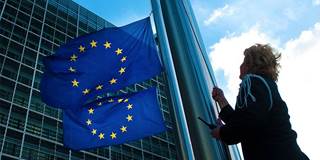Europeans are increasingly glorifying the past to compensate for the disillusion and frustration of the present and the uncertainty of the future. Sixty years ago, a return to the past was precisely what European countries sought to avoid.
PARIS – Populism is on the rise throughout Europe, as both economically depressed and prosperous countries become increasingly frustrated with their established political elites. But populists are unlikely to take control of any European government in the foreseeable future, even where the risk currently seems highest, in countries such as Hungary, Greece, and France. The majority of voters, driven by fear or common sense, remain unwilling to accept the prospect of becoming isolated from the rest of Europe.

PARIS – Populism is on the rise throughout Europe, as both economically depressed and prosperous countries become increasingly frustrated with their established political elites. But populists are unlikely to take control of any European government in the foreseeable future, even where the risk currently seems highest, in countries such as Hungary, Greece, and France. The majority of voters, driven by fear or common sense, remain unwilling to accept the prospect of becoming isolated from the rest of Europe.